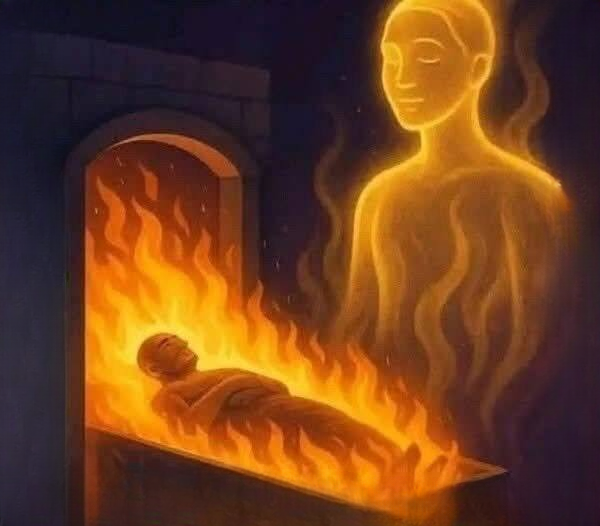In recent decades, cremation has become a common practice across many parts of the world, especially in Western societies. What was once considered unconventional or even taboo in certain religious circles is now viewed by many as a practical and meaningful choice. The rise of cremation can be attributed to a variety of factors—social change, cost considerations, environmental awareness, and personal beliefs about life, death, and legacy.
For Christians, however, cremation continues to inspire conversation and contemplation. Questions about faith, biblical interpretation, and tradition arise whenever a family faces the decision of how to lay a loved one to rest. This discussion is not only about what happens to the body after death but also about what these choices signify about one’s beliefs and hopes for the future.
This article explores cremation from a faith-based perspective—examining what the Bible says, how Christian traditions have evolved, and why many believers today approach the decision with understanding, grace, and confidence in God’s eternal promise.
The Growing Prevalence of Cremation
Across the modern world, the practice of cremation has steadily increased. In countries like the United States, the United Kingdom, and Canada, cremation rates have surpassed traditional burials in many regions. The reasons behind this trend are both practical and personal.
Economically, cremation often costs less than a traditional burial, which can involve expenses for a casket, plot, and headstone. Environmental concerns also play a role—many people view cremation as a less resource-intensive method, reducing land use and certain ecological impacts associated with embalming chemicals or concrete vaults.
Beyond practical considerations, changing cultural and spiritual attitudes have shaped how families approach death and remembrance. Many people are seeking more flexible, personalized memorials that reflect a loved one’s individuality, beliefs, and lifestyle.
Still, within Christian communities, cremation invites reflection on deeper theological questions—ones that touch the heart of faith, tradition, and hope.
The Core Question: Is Cremation Compatible with Christian Faith?
One of the most frequent questions Christians ask is whether cremation is acceptable in the eyes of God. Is it considered sinful or disrespectful? Does it conflict with the belief in bodily resurrection?
The answer, as many theologians and biblical scholars agree, lies not in a direct commandment but in interpretation. The Bible does not explicitly forbid cremation, nor does it prescribe one specific method of caring for the body after death. Rather, it presents overarching principles about life, respect, and the hope of resurrection—leaving room for personal and cultural discernment.
Understanding this requires a closer look at what scripture and Christian history actually say about burial, the human body, and the meaning of resurrection.
What Scripture Reveals About Burial and the Body
In biblical times, burial was the most common practice. The Old and New Testaments contain numerous examples of individuals being laid to rest in tombs, caves, or graves. Abraham purchased the cave of Machpelah to bury Sarah (Genesis 23). Jacob and Joseph were also buried in accordance with family and cultural customs. Most notably, Jesus Himself was placed in a tomb after the crucifixion—a detail that gives burial deep symbolic importance for Christians.
For many believers, burial represents continuity with these scriptural precedents. It reflects the belief that the body, though mortal, is sacred—a vessel that carried the presence of the Holy Spirit. Burial has also symbolized faith in the resurrection, echoing the image of planting a seed that will one day rise anew, as described by the Apostle Paul in 1 Corinthians 15:42-44.
Yet, nowhere in scripture is cremation directly condemned. The focus, rather, is consistently on how one lives and honors God, not the specific method of one’s final rest.
Cremation in Historical and Theological Context
Throughout history, Christian attitudes toward cremation have varied. In the early centuries of the Church, burial was seen as the preferred way to honor the body and imitate Christ’s own burial. The practice also served as a public declaration of faith in bodily resurrection—a core belief that distinguished Christianity from some pagan traditions of the time, where cremation was often linked with non-biblical spiritual practices.
During the Middle Ages, cremation was sometimes associated with acts of disrespect or heresy, largely due to its use as a form of punishment for criminals or enemies of the Church. As a result, for many centuries, Christians generally avoided cremation out of reverence for both tradition and theological symbolism.
However, as time progressed and societies evolved, perspectives began to shift. The rise of modern science, medicine, and global travel created new practical realities. Public health concerns, urban crowding, and land limitations made cremation more widely accepted in some areas. In the 20th and 21st centuries, many Christian denominations—including Roman Catholic, Protestant, and Orthodox branches—have revisited their teachings, emphasizing spiritual meaning over physical form.
Modern Christian Views on Cremation
Today, most mainstream Christian leaders teach that cremation is not a sin and does not interfere with salvation or resurrection. The focus is on the eternal nature of the soul, not the temporary condition of the body.
The Catholic Church, for example, once prohibited cremation but now allows it, provided it is not chosen for reasons contrary to Christian faith. The Church encourages families to treat cremated remains with the same dignity as a body—placing ashes in a sacred space such as a cemetery or columbarium, rather than scattering them without ceremony.
Similarly, many Protestant denominations emphasize freedom of conscience. Pastors often counsel families to make thoughtful, prayerful decisions based on their beliefs and circumstances. What matters most, they affirm, is that the process reflects reverence, love, and faith in God’s promise of eternal life.
The Body as a Temple and the Soul’s Eternal Journey
A recurring theme in Christian teaching is that the body is “a temple of the Holy Spirit” (1 Corinthians 6:19). This phrase underscores the sacredness of human life and the responsibility to honor one’s body in life and death. Some believers interpret this to mean that cremation might be irreverent. Others, however, view the “temple” metaphor spiritually rather than physically—understanding that God values the soul far above the earthly vessel that temporarily houses it.
When viewed through this lens, cremation does not diminish one’s faith or dignity. Whether the body returns to dust naturally or through fire, the soul’s destiny remains in God’s hands. As the Book of Genesis reminds us, “for dust you are and to dust you shall return” (Genesis 3:19). Cremation, in essence, can be seen as another way of fulfilling this natural truth.
Cultural Traditions and the Meaning of Respect
Across different cultures, burial and cremation have carried distinct meanings. In many Western societies, burial has long symbolized respect, continuity, and a connection to family heritage. Cemeteries became sacred places of remembrance—spaces where generations could visit, reflect, and honor those who came before.
Cremation, historically linked in some regions to non-Christian traditions, was sometimes misunderstood or viewed with caution. However, modern motivations for cremation differ greatly from ancient practices. Today, families choose it for a range of thoughtful reasons: to simplify arrangements, to minimize costs, or to align with a loved one’s environmental values.
As these motivations evolve, many Christian communities are learning to embrace compassion and understanding rather than judgment. The emphasis has shifted toward ensuring that whatever method is chosen reflects reverence, gratitude, and faith.
Environmental and Practical Considerations
One reason cremation has grown in popularity is its practicality. Traditional burials can require land, maintenance, and materials that some view as environmentally burdensome. While cremation has its own ecological impact, it is often seen as a simpler and more sustainable choice for families mindful of stewardship of the Earth—a value deeply rooted in Christian ethics.
Some believers also appreciate the flexibility cremation allows in memorial planning. Ashes can be kept in a family urn, interred in a church garden, or placed in a memorial niche. This flexibility can offer families time to plan meaningful services that reflect faith and personal legacy.
Faith, Hope, and the Promise of Resurrection
The Christian faith rests upon the promise of resurrection—a belief that transcends the physical process of death. When believers affirm that God will “raise the dead,” they express confidence not in human preservation but in divine power. The same Creator who formed humanity from dust can surely restore life, regardless of how the body returns to the earth.
This assurance helps many Christians approach cremation with peace rather than fear. Resurrection, after all, is not dependent on the condition of earthly remains but on the eternal word and power of God. As the Apostle Paul wrote, “The dead will be raised imperishable, and we will be changed” (1 Corinthians 15:52).
Thus, whether one chooses burial or cremation, the core message remains the same: life on earth is temporary, but faith endures forever.
The Role of Pastors and Spiritual Guidance
When families face end-of-life decisions, pastors and spiritual leaders often provide support and clarity. Their role is not to impose judgment but to offer comfort rooted in scripture and faith. Many encourage believers to discuss their wishes openly with loved ones, ensuring that choices reflect personal convictions and peace of mind.
Churches today also seek to balance tradition with compassion. Some still prefer burial ceremonies as an expression of continuity, while others have developed beautiful liturgies for cremation services—prayers, readings, and blessings that honor both the body and the soul’s eternal journey.
Personal Decision and the Call to Grace
Ultimately, the choice between burial and cremation is a deeply personal one. Each believer’s decision is shaped by faith, culture, family heritage, and financial considerations. What unites Christians is not uniformity of practice but the shared hope in Christ’s resurrection.
Choosing cremation does not signify a lack of faith any more than choosing burial guarantees it. Both can be carried out with profound reverence and love. What matters most is that the decision honors God and brings peace to those left behind.
A Reflection on Faith Beyond the Physical
When all is said and done, cremation invites believers to reflect on the deeper truths of Christianity—the temporary nature of life, the sanctity of creation, and the eternal promise of redemption. The physical body, however cherished, is but a vessel. The soul’s journey, sustained by grace, continues into the presence of God.
In this light, cremation becomes not a contradiction of faith but a reminder of its essence: that what truly endures is not the body but the spirit, and not the tomb but the resurrection.
As Christians around the world continue to navigate changing times and traditions, they do so with a faith that remains constant—trusting that nothing, not even death, can separate them from the love of God.
Conclusion
Cremation and burial both serve as expressions of respect, remembrance, and faith. The Bible does not demand one or forbid the other; rather, it calls believers to live and die in the light of God’s truth. Whether a person’s remains rest in the earth or return to dust through flame, the promise of eternal life stands firm.
For Christians, the discussion about cremation is ultimately less about physical processes and more about spiritual assurance. It is a conversation that invites humility, reflection, and peace—a reminder that while our bodies return to the earth, our souls rest in the hands of a loving Creator.




